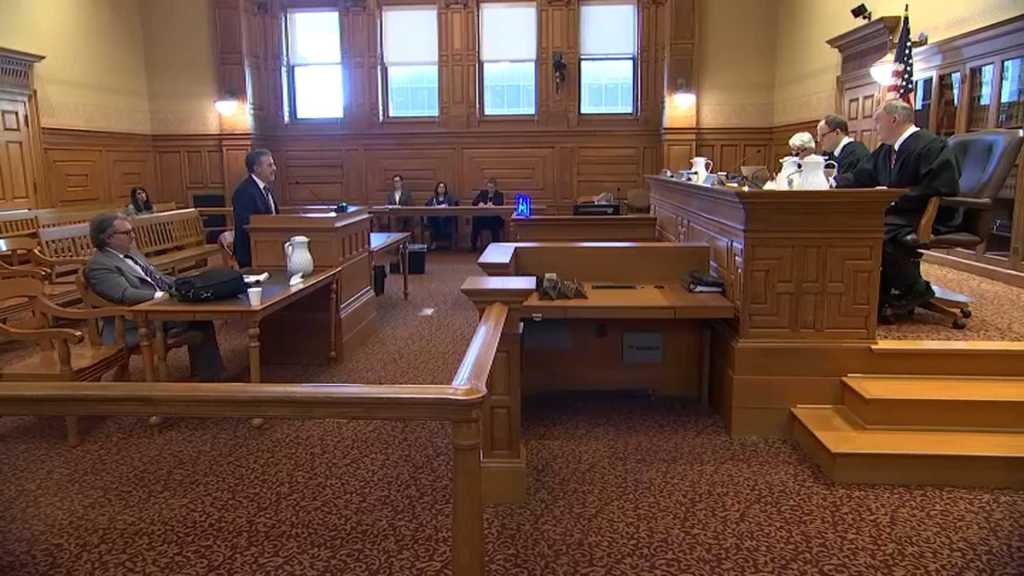After losing twice in court, the retirement board in Winthrop, Massachusetts, is renewing its push to strip the town's former police chief of his pension and claw back more than $1 million of retirement benefits he received over the last two decades.
A lawyer for Winthrop's retirement system argued in court Thursday that former chief Angelo LaMonica's prior conviction on federal tax charges should have disqualified him from getting a taxpayer-funded pension.

Speaking before a panel of Appeals Court judges, lawyer Michael Sacco said there was a clear connection between money LaMonica received under the table years earlier and his job as police chief.
"He, in our view, clearly accepted money to turn a blind eye to the video poker machines that were deployed throughout Winthrop" Sacco told the NBC10 Boston Investigators.
But LaMonica's lawyer, Nick Poser, has successfully argued in two lower courts that the retirement board's argument is flawed. There isn't sufficient information in the case records to show LaMonica took a bribe, Poser said Thursday.
"This is a case that should never have had a pension forfeiture applied to it because Mr. LaMonica, not that it's great conduct, but he took money that he didn't disclose on his federal tax returns, and that's a personal crime," Poser said. "He did that at the kitchen table, as opposed to doing it in his official capacity as a police officer in the town of Winthrop."
Investigations
LaMonica abruptly retired in 1995 amid rumors he was the focus of an FBI probe. Before long, federal prosecutors accused the town's former top cop of taking cash bribes to look the other way and ignore illegal gambling at local establishments.
LaMonica eventually entered a guilty plea in the case, spent 14 months in prison, and paid a $20,000 fine.
Under state law, public employees who are convicted of crimes related to their job risk losing their retirement benefits.
However, despite the conviction, Winthrop's retirement system paid LaMonica his pension for more than two decades, determining at the time that his criminal conduct wasn't linked with his duties as police chief.
LaMonica pleaded guilty in 1995 to six counts of filing false tax returns. As part of the plea deal, prosecutors dismissed the other counts in the indictment relating to extortion and conspiracy to obstruct gambling laws.
After receiving a tip in 2016, Ryan Kath reviewed the federal court file and made an inquiry about the case. The questions triggered a new review by the Winthrop Retirement Board.
Unlike in 1995, board members determined LaMonica's crime was directly related to his public position. They concluded the income the former police chief didn't report on his tax forms was bribe money. They also demanded he pay back the roughly $1 million he received over that time period.
A District Court judge in Boston overturned the Winthrop Retirement Board decision and reinstated LaMonica's pension payments, however.
Winthrop appealed to Suffolk Superior Court, but lost that argument, too.
"I agree with the Board that Mr. LaMonica's alleged behavior was reprehensible," Judge Paul Wilson wrote in his October 2018 decision. "But the Board simply was not entitled to rely on his alleged acceptance of payoff, because the indictments relating to those payoffs were dismissed, and Mr. LaMonica only pleaded guilty to crimes that did not involve his position."
Poser said he is 100% confident LaMonica will keep his pension after the Appeals Court finishes its review of the case.
"In this case, there were no facts that he pled, to that he was sentenced on, that connect him to his job as a police officer, with getting money -- illicit money -- that he didn't declare on his tax returns," he said.
Sacco, the lawyer for the retirement board, said the law that strips public employees of their pensions following a criminal conviction was relatively new when the board evaluated the case years earlier, and hadn't been tested in court.
After reviewing the record again three years ago, "it was clear that some action needed to be taken," Sacco said.
"There's a clear fiduciary interest not only to the retirement system, but to the taxpayers of Winthrop who fund the majority of that pension," he said.
The Appeals Court took arguments from the two sides under advisement Thursday. It will rule on the case within the next several months.



